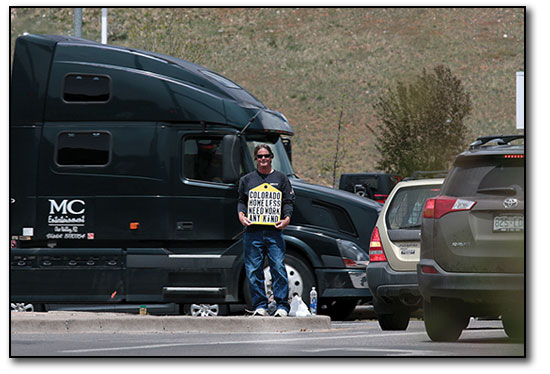|
|
Begging for change
City looks to revise begging and panhandling rules
by Tracy Chamberlin
Durango is not alone. It’s not the only community in the state, or the nation, trying to walk the fine line between free speech and bullying. Between compassion and harassment.
Colorado Springs, Fort Collins, Telluride and Grand Junction have all recently dealt with lawsuits or the threat of suits from the American Civil Liberties Union regarding begging and panhandling ordinances in their communities.
Last fall, the ACLU sent Durango officials a letter voicing concerns with citations that were being issued under the current panhandling ordinance, which essentially bans all begging. City Attorney Dirk Nelson said they voluntarily agreed to suspend writing tickets under that ordinance, which he called “antiquated” during a City Council meeting last week.
“This is a humanitarian issue, for sure, and it’s a very delicate one,” said Ryan Lowe, owner and operator of the Ore House restaurant, during last week’s meeting. “I’m glad the city is approaching it very carefully. Not only for the legal aspect, but for the human rights aspect.”
The issue for the community is balancing a desire to offer help to those in need and an individual’s choice not to take that assistance. The issue in the courts is the need to uphold someone’s right to ask for spare change and another person’s right to say no.
Several local business owners in the downtown area, including Lowe, came forward during last week’s public hearing to share stories and voice concerns.
Some talked about their concerns for the safety of their customers, employees and families. Others shared stories when they said they felt fearful, intimidated, even bullied by individuals lingering around their shops and restaurants.
One thing brought up by all those who spoke, as well as several city officials, was the noticeable increase in instances of begging around Durango.
Nelson said the uptick isn’t related to the ACLU letter sent to the city and he can’t say why there has been an increase. But, it’s been noticeable in Durango and in other communities across the state and the country.
The right to ask for money, to ask for solicitations, is treated as free speech. However, federal courts are split on some of the specific points. The U.S. Supreme Court could clarify these discrepancies, but so far has not taken up the issue.
That could change with a Massachusetts case currently moving through the courts, Thayer vs. the City of Worcester. The Supreme Court has not decided whether or not they’ll take the Thayer case but, according to Nelson, the speculation is that they won’t take it on.
Another case is pending in the federal courts in which the ACLU filed a lawsuit against Grand Junction over its panhandling ordinances.
Nelson said he was hoping to get some guidance on how to handle Durango’s ordinances from the Grand Junction case. But the district judge recently put the case on hold, waiting to see if the Supreme Court will take up the Thayer case.
At this point, Nelson said the city is trying to take all the cases that have been decided to frame an ordinance for Durango that is both constitutional and protects citizens.
Nelson said in an interview that they are keeping the ACLU informed. “I think they are keeping an eye on what we’re doing,” he added. “I’m hoping what we do will not spur a lawsuit.”
There are a handful of behaviors that have not been challenged in court. Referred to as legal safe havens, these address instances of aggressive panhandling, like intimidating or threatening actions, obscene conduct, or touching and grabbing.
“We do have issues of aggressive panhandling downtown,” Ray Shupe, assistant operations division commander with the Durango Police Department, explained during last week’s meeting.
Shupe added there have been cases of touching, intoxication and groups soliciting or blocking pathways. Officers need a way to address these issues and have some form of recourse.
City Councilor Christina Rinderle said the city needs to have a stronger presence of police downtown. It sends a message that the kind of aggressive bullying residents and visitors have experienced is not going to be tolerated.
The city is planning to re-assign school resource officers to the downtown and river trail areas at the close of the school year.
“If we increase police presence, this problem will go away,” City Councilor Keith Brant said during last week’s meeting. “People are not going to continue to do these behaviors with uniformed policemen and women walking down main street.”
Brant said the same was true of river put-ins several years ago, where incidents of disorderly conduct or intoxication dropped dramatically after an increase in police presence.
Along with the public hearing and discussions on begging and panhandling, the city looked at an ordinance dealing with medians in an effort to keep people from loitering on the typically narrow dividers. This ordinance is about safety, Nelson said.
City Councilor Dick White brought up Third Avenue. He wondered if the boulevard’s wide center area would be considered a median, and if changes to either the begging or median ordinances would simply move the current problem to Third Avenue.
Those are issues the council and city staff plan to continue discussing at the council’s next meeting. The public hearing for both proposed ordinances was also extended to the next meeting, scheduled for 6 p.m., Tues., May 19.
“We’re not trying to infringe on someone’s right to free speech,” Rinderle said. “We’re trying to protect the rights of our other citizens, and business owners and the community as well.”
In this week's issue...
- December 18, 2025
- Let it snow
Although ski areas across the West have taken a hit, there’s still hope
- December 18, 2025
- Look, but don't take
Lessons in pottery theft – and remorse – from SW Colorado
- December 11, 2025
- Big plans
Whole Foods, 270 apartments could be coming to Durango Mall parcel

